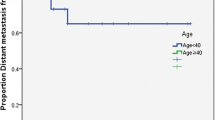Abstract
There is controversy regarding prognosis and treatment of young patients with oral cavity cancer compared to their older counterparts. We conducted a retrospective case-matched analysis of all adult patients younger than 40 years and treated at our institution for a squamous cell carcinoma of the oral cavity. Only non-metastatic adult patients (age >18) with oral tongue cancer were eventually included and matched 1:1 with patients over 40 years of age, at least 20 years older than the cases, with same T and N category and treatment period. Sixty-three patients younger than 40 had an oral cavity squamous cell cancer out of which 57 had an oral tongue primary during the period 1999–2012, and 50 could be matched with an older control. No difference could be seen between younger and older patients with regard to overall, cancer-specific, or progression-free survival. The patterns of failure were similar, although in young patients, almost all failures occurred during the first 2 years following treatment. Although overall survival shows a trend toward lower survival in older patients, cancer-specific survival and analysis of pattern failure suggest that disease prognosis is similar between young and older adults with oral tongue cancer. Further work is needed to identify the younger patients with poorer prognosis who overwhelmingly fail during the first year after treatment and could benefit from treatment intensification. Until then, young adults ought to be treated using standard guidelines.


Similar content being viewed by others
References
Ten Leading Causes of Death by Age Group (2010) Office of statistics and programming, national center for injury prevention and control. http://www.cdc.gov/injury/wisqars/pdf/10LCID_All_Deaths_By_Age_Group_2010-a.pdf Accessed 25 April 2016
Müller S, Pan Y, Li R, Chi AC (2008) Changing trends in oral squamous cell carcinoma with particular reference to young patients: 1971–2006. The Emory University experience. Head Neck Pathol 2:60–66. doi:10.1007/s12105-008-0054-5
Patel SC, Carpenter WR, Tyree S, Couch ME, Weissler M, Hackman T et al (2011) Increasing incidence of oral tongue squamous cell carcinoma in young white women, age 18 to 44 years. J Clin Oncol Off J Am Soc Clin Oncol 29:1488–1494. doi:10.1200/JCO.2010.31.7883
Shiboski CH, Schmidt BL (2005) Jordan RCK. Tongue and tonsil carcinoma: increasing trends in the US population ages 20–44 years. Cancer 103:1843–1849. doi:10.1002/cncr.20998
Llewellyn CD, Linklater K, Bell J, Johnson NW, Warnakulasuriya S (2004) An analysis of risk factors for oral cancer in young people: a case-control study. Oral Oncol 40:304–313
Bachar G, Hod R, Goldstein DP, Irish JC, Gullane PJ, Brown D et al (2011) Outcome of oral tongue squamous cell carcinoma in patients with and without known risk factors. Oral Oncol 47:45–50. doi:10.1016/j.oraloncology.2010.11.003
Pytynia KB, Grant JR, Etzel CJ, Roberts D, Wei Q, Sturgis EM (2004) Matched analysis of survival in patients with squamous cell carcinoma of the head and neck diagnosed before and after 40 years of age. Arch Otolaryngol Head Neck Surg 130:869–873. doi:10.1001/archotol.130.7.869
Hyam DM, Conway RC, Sathiyaseelan Y, Gebski V, Morgan GJ, Walker DM et al (2003) Tongue cancer: do patients younger than 40 do worse? Aust Dent J 48:50–54
Hilly O, Shkedy Y, Hod R, Soudry E, Mizrachi A, Hamzany Y et al (2013) Carcinoma of the oral tongue in patients younger than 30 years: comparison with patients older than 60 years. Oral Oncol 49:987–990. doi:10.1016/j.oraloncology.2013.07.005
Atula S, Grénman R, Laippala P, Syrjänen S (1996) Cancer of the tongue in patients younger than 40 years. A distinct entity? Arch Otolaryngol Head Neck Surg 122:1313–1319
Sarkaria JN, Harari PM (1994) Oral tongue cancer in young adults less than 40 years of age: rationale for aggressive therapy. Head Neck 16:107–111
Garavello W, Spreafico R, Gaini RM (2007) Oral tongue cancer in young patients: a matched analysis. Oral Oncol 43:894–897. doi:10.1016/j.oraloncology.2006.10.013
Schemper M, Smith TL (1996) A note on quantifying follow-up in studies of failure time. Control Clin Trials 17:343–346
Pignon J-P, le Maître A, Maillard E, Bourhis J, MACH-NC Collaborative Group (2009) Meta-analysis of chemotherapy in head and neck cancer (MACH-NC): an update on 93 randomised trials and 17,346 patients. Radiother Oncol J Eur Soc Ther Radiol Oncol 92:4–14. doi:10.1016/j.radonc.2009.04.014
Chang T-S, Chang C-M, Ho H-C, Su Y-C, Chen L-F, Chou P et al (2013) Impact of young age on the prognosis for oral cancer: a population-based study in Taiwan. PLoS One 8:e75855. doi:10.1371/journal.pone.0075855
Lassig AAD, Lindgren BR, Fernandes P, Cooper S, Ardeshipour F, Schotzko C et al (2013) The effect of young age on outcomes in head and neck cancer. Laryngoscope 123:1896–1902. doi:10.1002/lary.23932
Udeabor SE, Rana M, Wegener G, Gellrich N-C, Eckardt AM (2012) Squamous cell carcinoma of the oral cavity and the oropharynx in patients less than 40 years of age: a 20-year analysis. Head Neck Oncol 4:28. doi:10.1186/1758-3284-4-28
Majchrzak E, Szybiak B, Wegner A, Pienkowski P, Pazdrowski J, Luczewski L et al (2014) Oral cavity and oropharyngeal squamous cell carcinoma in young adults: a review of the literature. Radiol Oncol 48:1–10. doi:10.2478/raon-2013-0057
Mirghani H, Amen F, Moreau F, St Guily JL (2015) Do high-risk human papillomaviruses cause oral cavity squamous cell carcinoma? Oral Oncol 51:229–236. doi:10.1016/j.oraloncology.2014.11.011
Author information
Authors and Affiliations
Corresponding author
Ethics declarations
Conflict of interest
None of the authors has a conflict of interest regarding this research.
Funding
No specific funding was used.
Research involving human participants and/or animals
This research is a retrospective assessment of outcomes of patients receiving standard of care treatment, which is not considered as experimental.
Informed consent
Informed consent was waived due to the retrospective nature of the study, which was approved by the institutional review board.
Rights and permissions
About this article
Cite this article
Blanchard, P., Belkhir, F., Temam, S. et al. Outcomes and prognostic factors for squamous cell carcinoma of the oral tongue in young adults: a single-institution case-matched analysis. Eur Arch Otorhinolaryngol 274, 1683–1690 (2017). https://doi.org/10.1007/s00405-016-4419-1
Received:
Accepted:
Published:
Issue Date:
DOI: https://doi.org/10.1007/s00405-016-4419-1




